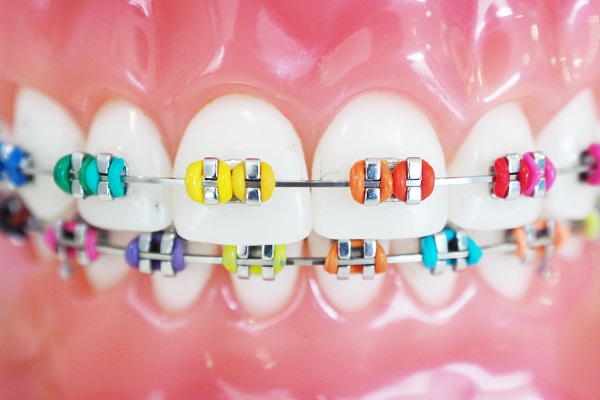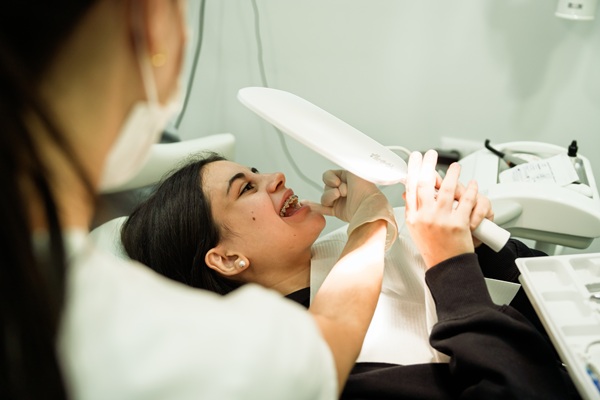Taking Care of Teeth After Orthodontics Treatment

Straightening your teeth with orthodontics improves how they look, particularly if your teeth are healthy after treatment. However, orthodontic appliances like braces tend to get in the way of cleaning teeth, and their components can serve as havens for food particles and oral bacteria that convert them into acids.
Clear aligners can also increase the wearer’s risk of tooth decay. These transparent plastic trays fit tightly over teeth and prevent saliva from washing away acids and food particles like it normally does. A person who has just completed treatment with orthodontics can have straightened teeth that have been damaged by tooth decay. The decay can lead to teeth structures breaking down and to teeth becoming discolored.
Oral hygiene after treatment with orthodontics
People who straighten their teeth with clear aligners are less likely to deal with tooth decay if they always clean their teeth before putting in their aligners. Things are a bit more complicated for people who wear braces. Regardless of how well they take care of their teeth during treatment, there might be decay that has built up underneath the brackets of the braces, and the device might leave stains on teeth.
Dentists typically recommend teeth cleanings following treatment with orthodontic appliances. Teeth cleaning removes tartar build-up on teeth and any stains on them. The procedure can drastically improve the appearance of a patient’s teeth after they have been straightened. Teeth whitening treatments can be performed if needed.
Good oral hygiene also helps protect a patient’s teeth and gums after teeth-straightening treatments. Dentists recommend the following.
Brush after meals with prescription-grade toothpaste
These products help mineralize teeth and provide a higher level of cleanliness than regular toothpaste. Brushing after every meal is ideal, especially if teeth have already been weakened by tooth decay.
Floss daily
Flossing teeth cleans interdental spaces. Flossing becomes even more important when teeth have already been weakened by decay during treatment with orthodontic appliances.
Use prescription-grade mouthwash
Mouthwash cleans all the areas in the mouth missed by brushing and flossing. A therapeutic mouthwash prescribed by a dentist kills oral bacteria, protecting teeth and gums from decay and gum disease, respectively.
Visit a dentist twice a year
A dentist has many tools at their disposal that can help protect teeth against decay, like dental sealants and fluoride treatments. A dentist can also provide any appropriate treatments for teeth that have been damaged by decay or infected gums. Treatments for decayed teeth include fillings, composite bonding, and dental crowns.
Good oral hygiene allows you to enjoy the results of your treatment
Good oral hygiene can help you avoid having to deal with tooth decay and gum disease due to your treatment with orthodontic devices. It can keep your teeth looking their best after your treatment. Call us or stop by our Hanford clinic to learn more about how to properly take care of your teeth after teeth-straightening treatments.
Request an appointment here: https://hanfordcosmeticdentist.com or call Rushi Panchal DDS at (559) 426-1124 for an appointment in our Hanford office.
Check out what others are saying about our dental services on Yelp: Orthodontics in Hanford, CA.
Recent Posts
Seeking a straighter smile often begins with a visit to a cosmetic dentist. These professionals offer advanced teeth straightening options that improve alignment while also considering the appearance of the entire smile. Whether correcting mild crowding or closing noticeable gaps, a cosmetic dentist evaluates structure, bite, and facial balance to create a personalized plan that…
Dental implant restoration is a reliable and long-lasting solution for replacing missing teeth. However, caring for and maintaining your dental implant from the start is important to get the best results. A consistent oral hygiene routine and regular dental visits are necessary to protect this investment in your long-term oral health.Brushing and flossing are essential…
Jaw pain, headaches, and difficulty chewing can severely impact daily life. Fortunately, a TMJ dentist offers specialized care to diagnose and treat disorders of the temporomandibular joint (TMJ), providing relief and restoring comfort. These dental professionals specialize in identifying the underlying causes of TMJ disorders and developing treatment plans tailored to your specific needs.The temporomandibular…
A preventive dentist promotes long-term oral wellness by focusing on early detection, regular checkups, and proactive measures to protect teeth and gums from disease. By prioritizing prevention, you can avoid many dental issues before they even begin. Explore some of the most frequently asked questions about preventive dentistry, gain valuable insight that can help you…


